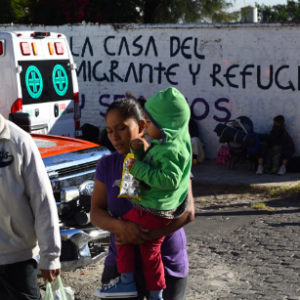Texas has earned the unfortunate distinction of being the first — and so far the only — state to refuse publicly to resettle new refugees to the United States. While Texas does many things right, this is not one where we should feel proud.
It’s clear we have a broken immigration system in this country. Real reform has not happened since the 1980s, and our current system is in desperate need of updating. For those who go through the legal steps to immigrate to this country, the process is often slow and complicated.
Incentives are not aligned closely with the workforce needs of our country. We haven’t figured out how to handle effectively and legally the status of 10.5 million unauthorized immigrants living in this country. And our border security apparatus needs to be strengthened and updated, as it was designed for a time when the immigrant population looked much different than today.
It’s beyond time that Congress comprehensively address these issues, and we should continue to push for reform.
However, lack of action to address comprehensive immigration reform does not mean we should stop accepting refugees. Last September, President Trump issued an executive order requiring governors to agree in writing to welcome refugees. He also lowered the annual cap on refugees allowed to settle in the United States to a historic low of 18,000.
In response, Gov. Greg Abbott became the first governor to indicate that our state was unwilling to continue welcoming refugees. Those decisions both go against our American tradition of being a welcoming, hopeful country where people can get in line, pay their dues, assimilate into American society, and live the American dream. Thankfully, a federal judge in Maryland has put a temporary halt to the executive order allowing states to opt out.
It’s important to understand how people receive refugee status and how they fit into the broader group of immigrants who settle in the United States each year. Refugees are legal immigrants and come from dire circumstances; they are people who cannot stay in their home country or return because of war, violence or persecution. They are small percentage of the immigrant population; last year, only about 3 percent of the total new immigrants to the United States were refugees.
In recent years, refugees have largely come from the Democratic Republic of Congo, Burma and other countries going through significant unrest. At the Bush Institute, we have supported refugees from North Korea, a small but brave population of escapees who have risked their lives for opportunity in a free society.
Too often, welcoming legal immigrants is portrayed as a drain on our resources, when in fact immigrants are strong contributors to economic growth nationwide and particularly in Texas. Immigrants are more likely than natives to be employed, and cities with large increases in their immigrant populations tend to experience strong economic growth. Refugees in particular have been found to have positive effects on the economy, becoming net contributors in the United States eight years after arrival and pay back more in taxes than what they receive in benefits.
Texas is a growing state — and has been a proudly welcoming state, with increased economic growth and productivity. Texas’ population has been growing by about 1,000 people every day; half of those are babies born in the state, and other half are people moving to Texas. That’s over 180,000 people who are moving to our state each year.
Yet the number of refugees that settled in Texas in fiscal year 2019 was approximately 2,500, a small fraction of the overall population moving to Texas every year. Forty-two other states have made the opposite decision and are welcoming refugees, so we’re essentially taking the welcome mat away from Texas’ doorstep while nearly the entire rest of the country is keeping that welcome mat on their doorstep. Our loss is the gain of other states in the United States.
It’s possible to be both a nation of immigrants and a nation of laws. Our country has a proud heritage of being compassionate, while also being a place that upholds and enforces our laws. While there may be heated debates about who and how many immigrants should be given legal status each year, refugees are overwhelmingly deserving of a new and welcoming home. I hope we can call on our better selves and rethink this decision.

